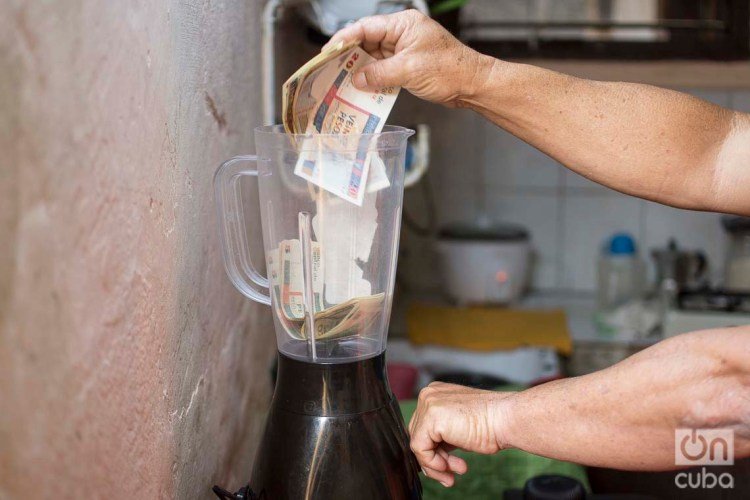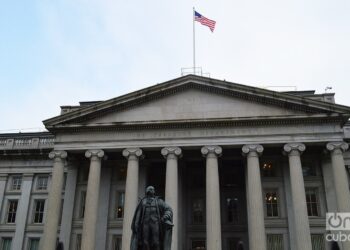The financial situation Cuba has been experiencing is already a structural problem of its economy. There are multiple factors that affect the problem: from the increase in the actions of the blockade to internal weaknesses such as the failure to comply with investment plans, the fall in income from medical services and the decrease in different national productions for export, for example sugar, among others. In the near future, the effects of the pandemic affecting the world will also be intensely felt by the island, given the resounding drop of a main source of income, such as tourism.
It is evident that the shortage of foreign exchange has produced a shortage in stores outside the regulated circuit. In the different markets, both CUC and CUP markets, the necessary products are missing to complete the basic monthly food basket. To “escapar” (to get along), as it’s said in Cuba.
In these stores, there are long when the State stocks them with a product that in short supply― chicken, detergents, toilet paper and tomato puree, among others. There is an exhortation to avoid the crowds due to the spread of COVID-19, but at the same time the population is wearing itself out in long lines when it comes to acquiring those scarce goods that are sorely needed.
Then resellers and hoarders appear. A part of the population works and is unable to line up to acquire them. Although the abusive prices they impose are rightly criticized, the truth is that the same population buys them later.
It does not appear that this phenomenon can be eliminated with strong measures or the imposition of fines. Prices would rise and those economic agents would become more clandestine. The only thing that would solve the problem would be to increase imports or national productions.
The idea that it is time to “unblock” the productive forces is recurrent among some social scientists today. Reality is proving them right. What is observed or published in Cuba is that the emphasis is on state-owned companies―and this is not incorrect―but the existing reserves in the private sector are not being encouraged, and they are in no way negligible.
Why continue to insist on prohibiting self-employed people from selling imported items? It is already known that selling them is not legalized in the catalog of activities they can undertake. However, a question arises: what exactly is the argument for not legalizing them? Are there no indirect methods in the economy, such as taxes, so that the State also benefits from these sales (in fact, it already does) by collecting customs taxes?
Discontent has been exposed in some places, and the authorities know this. Indeed, it is time to think as a country.
The moment that Cuba is going through is very complex, and if the State cannot react quickly to supply food or services due to the lack of foreign exchange to import, it must then take measures not included among its priorities: for example, reducing spending on new hotel construction for tourists in the somewhat distant future. Or authorizing the entry of foreign store chains, even if they compete with the failing Cuban stores. Or allow individuals who pay in foreign currencies the freedom to import.
There are good intentions when the import in freely convertible currency by Cuban nationals of certain products not marketed in the country is officially authorized. As it is already known, as of March 11 the CIMEX Corporation Office for Import Procedures and Accreditation to Clients was enabled and on the 16th the TRD and SASA chains were incorporated.
The measure, announced on February 6, 2020 at the Mesa Redonda television program, “refers to the process of import by individuals as a closed cycle, through which customers sign a contract with CIMEX and the specialized buyer―depending on the product to be imported―goes to the market, quotes, purchases, as well as sea or land transportation to where the client wishes and has been agreed in the contract.”
Regarding prices, it is pleasant to read what officials propose: “Based on the cost of acquiring the goods, the expenses associated with the import are added, with the condition that the final price is competitive and favorable for customers, so that it is beneficial to use this mechanism.” This is not valid for vehicles, which have a collection purpose. Few people will have access to them, since they are excessively taxed.
What’s interesting is that there are 62 groups of products. Some would serve to strengthen the self-employed, but others―and I think it is the most interesting―to improve and increase agricultural production. It is possible to think that in group 32, when referring to “equipment for the agricultural sector,” it is allowed to buy a tractor.
Group 24 allows individuals to buy infrastructure for construction: scaffolding, lifting means, etc. However, the first contradiction is that non-agricultural cooperatives are frozen, including those devoted to construction. In other words, no more cooperatives of this type will be approved and the existing ones cannot increase the number of members. Could it be that private and non-cooperative companies are preferred in construction? There is no clarity on this topic.
With this process of importing certain goods underway, it could be inferred that Cuba would not be very far from putting into effect the article of the Conceptualization of the Model, according to which individuals can constitute the following types of businesses:
- Small businesses, which are carried out, basically, by the worker and his family. These do not constitute business entities or have legal status.
- Medium, small and micro-scale private enterprises according to the volume of activity, number of workers and social purpose, which are recognized as legal entities. These enterprises carry out authorized medium- or lower-scale activities that contribute to the territorial and local development strategy, as well as to develop productive links between them and with other economic actors. Certain means of personal property can be used as means of production in these activities.
Here it is not a matter of praising small and medium-sized enterprises (SMEs) but of being pragmatic in the economy in an environment of continuous shortages of foreign exchange that have led to a drastic cut in imports, especially of consumer goods, and in which individuals are not allowed to sell products imported by them. Few options remain and time is running out.
The State cannot ignore that dissatisfaction exists, and that attempts to face it are increasingly recurrent.
It’s necessary to go back to statistics once in a while: 42% of the population has lived in a situation of economic crisis, that is, born after 1990; more than 100,000 Cubans have emigrated since 2014, generally for economic reasons, and thus, other indicators could be mentioned.
Is it so complex to understand that time is a factor to consider? Gradualness is valid if results are obtained, but if the economic situation is unsustainable due to the lack of foreign exchange, the pace must be speeded up.
It has been suggested that different entities and people propose an inventory of those things that hinder the operation of the economic life of the nation. Progress has been made in collecting them, but it is a compilation for this time.
The spread of COVID-19 will define new scenarios and effects, most of them risky and not very flattering. But once again a crisis situation can also become an opportunity to rethink everything that is necessary.
Now we must all face this new challenge and try to preserve health and the economy as much as possible. At the end of this time of contingency, solutions will have to be faced that cannot be postponed any longer.










